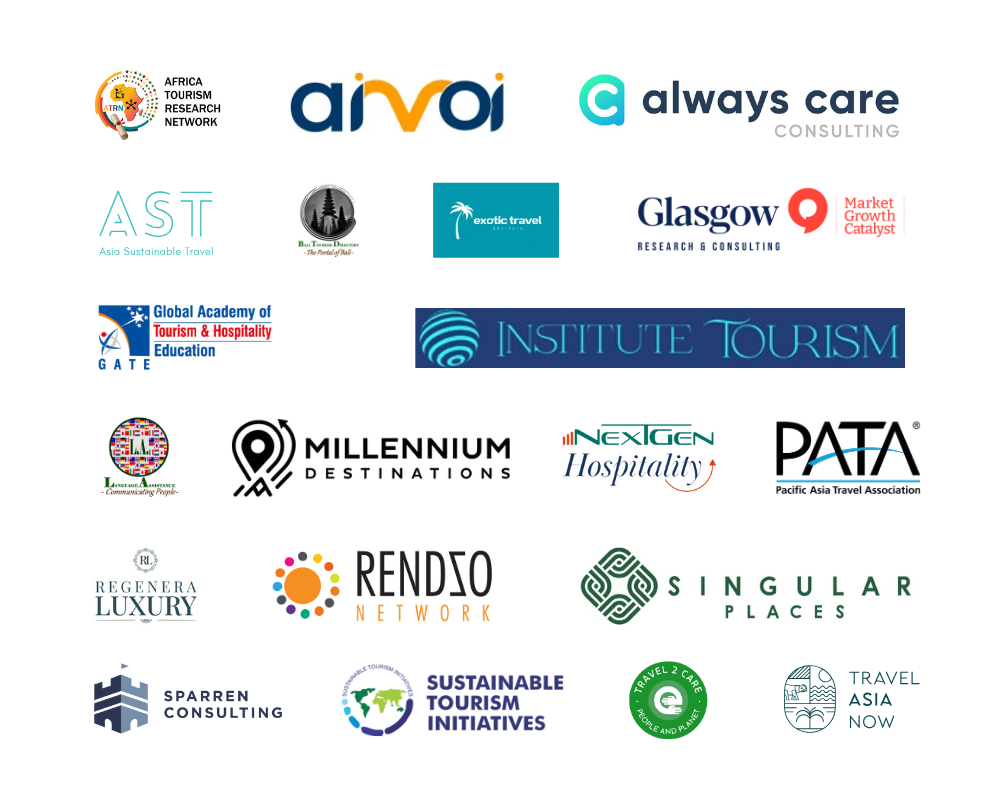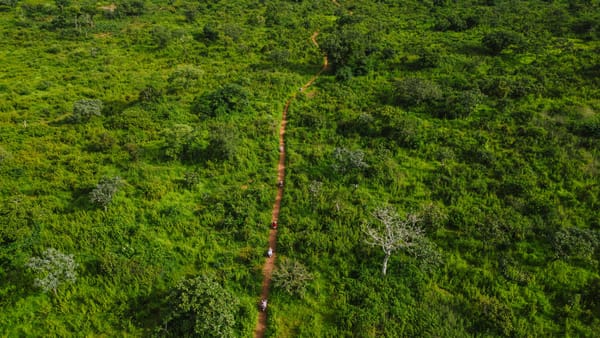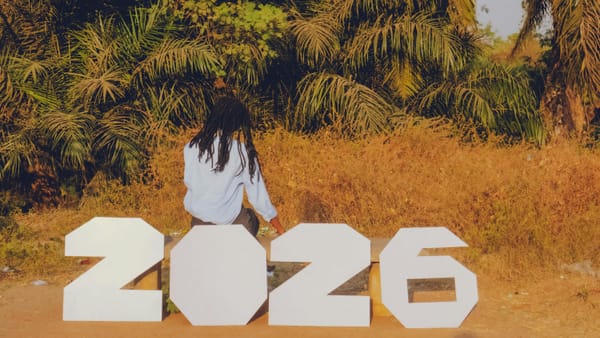Earning money from sustainable hospitality


Dear reader,
at the 25th WTTC Global Summit in Rome, Italy, which ended two days ago, key leaders from the public and private sectors declared that the summit served as a "declaration of our shared commitment to shaping a tourism model that balances growth with responsibility".
What a strange idea! First of all, we all know that balancing is difficult and includes the high danger of things becoming unbalanced again. A juggling act is not sustainable. That is why the Meaningful Tourism paradigm talks about alignment of interests, not compromises or balances.
Even more important, the declaration implies that there is a contradiction between growth and responsibility, that growth seems to be irresponsible to begin with. In the same way, responsible behaviour seems to hinder growth.
Shining through these words is the old-fashioned idea that responsible and sustainable behaviour is a nuisance and more importantly a cost factor, something which has to be done reluctantly, because the customers demand it and politicians see the opportunity to attract voters in being seen as doing the “green” thing.
Therefore, it comes as no surprise that the big players in tourism and hospitality, members of WTTC, are way behind other industries in accepting the need for Creative Destruction in the sense of Schumpeter (if you do not know him, time to look him up) and in starting on the journey of transformation towards new business models. Unfortunately, they have not been counterbalanced (sorry for the pun!) by the current leadership of UN Tourism, formerly and hopefully soon again known as UNWTO, as used to be the case before.
In the long run, only sustainable business models will survive the radical changes brought about by climate change, AI and new customer demands. However, even in the short run, there are instruments which should convince business leaders that it is profitable to invest in Meaningful Tourism and sustainable, practical changes. One example is Carbon Credits.

Carbon credits are tradable permits or certificates that represent the right to emit carbon dioxide (CO2) or other greenhouse gases (GHGs). They were developed as part of international efforts to combat climate change, stemming from agreements like the Kyoto Protocol and the Paris Agreement. The core idea is to put a price on carbon emissions, incentivizing companies, governments, and individuals to reduce their environmental footprint.
In essence, a carbon credit acts as a "license" for emissions. When purchased, it allows the buyer to offset their own emissions by supporting projects that avoid, reduce, or remove an equivalent amount of GHGs elsewhere—such as reforestation, renewable energy development, or methane capture from landfills.
Carbon credit trading operates on the principle of cap-and-trade or offsetting mechanisms: For the first one, governments or regulatory bodies set an overall emissions cap for industries or economies. This cap is divided into allowances (credits) allocated to companies. If a company emits less than its allowance, it can sell surplus credits to others exceeding their limits. This creates a market-driven incentive to innovate and reduce emissions.
For offsetting, entities voluntarily buy credits to compensate for unavoidable emissions. These credits fund certified projects verified by standards like Verra's Verified Carbon Standard (VCS) or the Gold Standard. Once used, credits are "retired" to prevent double-counting.
Trading occurs on exchanges or over-the-counter (OTC) platforms, where buyers and sellers negotiate prices based on supply, demand, project quality, and regulatory changes. For example, a tech company might buy credits from a wind farm project to offset its data centre emissions.
For hotel groups, cruise ship companies and other tourism service providers, reducing energy consumption can have a triple positive effect: Saving substantial amounts of energy payments, earning money from the resulting carbon credits, and showing to guests and visitors the effort beyond greenwashing to reduce the ecological footprint of the operations.
Specialised companies, like the MTC partner AiROI, provide 360-degree services from audits and recommendations for changes to reduce energy consumption to doing all the paperwork to acquire and sell the credits. Typically, the necessary investment will be recovered within a year, with money saved and money coming in effortlessly after that. Dashboards help the monitoring of the progress, trainings, workshops and information provided, making sure that suppliers, staff and customers are becoming part of the effort and aware of their ecological footprint. A recently introduced App even makes it possible for hotel guests to offset the pollution created during their stay, calculated to the penny during check-out, similar to offsetting offers by airlines.
Guests and customers will have arguments for a guilt-free trip, companies will save and earn money and improve their image towards guests, community and own staff, and there will be less energy needlessly consumed to light empty corridors, air-condition empty rooms, cool unused minibars, etc. Other programs to reduce water usage and to optimise waste management can be added to become part of the solution instead of part of the problem.
In an ideal world, there would be no buyers for carbon credits as all energy would be produced by renewable sources. However, with many billions of Dollars, Euros and Yuan still being invested in fossil fuel production every year, any instrument to reduce energy consumption has to be utilized.
As said above, this is not a “balancing act” between growth and responsibility; this is a solid here-and-now alignment of the interests of people, profit and planet.
As always, all best wishes from Prof. Dr. Wolfgang Georg Arlt, a.k.a. “Prof M”, and the whole team in Kathmandu and Manila.


This is the third part of a five-part series of articles written by our Certified Trainer for Switzerland, Max Haberstroh, using Johann Wolfgang von Goethe's famous theatre play, Faust, to discuss the development and future of tourism, including the darker side of the success story.
If you missed the first part, you can check it out here, and the second part here.
In Search of Higher Purpose
Part III
Tourism – Overrated or Underexposed?
Five years ago, the pandemic broke out. Using COVID-19 as the recurring theme, this essay aims to extrapolate Faust's human drama to our time. The focus on Travel & Tourism may identify major aberrations, but also offers new chances for a sector at the crossroads: Either we really mean our own claim to concretize 'meaningfulness', or we continue to just pay lip service to sustainability and solidarity, while serving mainly monetary rules. In this case, Travel & Tourism, divested of its 'soul', would be going deeply 'Faustian'.
Part III (of V) points to our struggle to prevent and heal the negative impacts of Travel & Tourism, with meager results, though. The industry seems too fragmented, stakeholders too ego-centered, and people too easygoing or pretentious to make ends meet. Despite its numerous workforce and an outstanding, yet by far not fully developed capacity to communicate and make networks, Travel & Tourism needs to address a more holistic approach, in order to be stuck in its ambiguous dead end of being overrated and underexposed.
Tourism – the 'Holistic' Approach
Former Tourism & Travel glamour has become a mirage: The outward appearance of ‘Tourism Unlimited’ has emerged due to the fact that formerly quite distinctive social markings have become blurred or wiped out entirely. Holiday destinations once considered exclusive have been offered in any catalogue or website. Nowadays, due to overtourism, marketing for destinations affected too much has been curtailed or entirely skipped, and the word 'de-marketing' is making its rounds.
Some places have gone through an especially striking transformation, for instance, Baden-Baden: Formerly reputed as ‘Europe’s summer capital’, where the rich and beautiful were staging their own ‘Vanity Fair’, the spa-city today is a site of convalescence and wellness even for clients on welfare.

New online lecture program on Meaningful Tourism starting in November
Last week, we mentioned in the MTC News that MTC will offer a series of webinars about Meaningful Tourism in different countries and regions.
Thanks to our cooperation with the Institute of Tourism, we can now update this information. Starting in November, we will provide 30 country- or region-specific first lectures introducing Meaningful Tourism in the country/region, to be followed by three more lectures on a continent-specific level, with one lecture per week. Additionally, a continent-specific weekly Q&A session on Zoom will be offered with “Prof M” answering questions.
There will be a small fee for participation; however, there will be special conditions for participants from Least Developed Countries and, to foster youth and women engagement, special discounts for young and female participants.
Each lecture series will feature the Certified Trainer for Meaningful Tourism Transformational Game Workshops for this country, a second regional expert, an expert about Carbon Credit trading, and the founder and Executive Director of MTC, Prof. Dr. Arlt (“Prof M”).
Participants will receive a certificate of participation. More details will follow; watch this space.
MTC featured in special edition for World Tourism Day
The Travel Explorer Newspaper Weekly, Volume No 06, Issue No 40, kindly published our World Tourism Day message in their World Tourism Special Supplement

MTC in Dubai
The Sustainable Destinations Forum, organised by Green Destinations, will take place at Expo City Dubai on October 28-29, 2025.
This influential event promises to be a cornerstone for the sustainable tourism sector, bringing together global leaders, innovators, and experts to shape the future of responsible travel.
The Certified Meaningful Tourism trainer for Oman, Dr. Ali Akaak, and Prof. Dr. Arlt (“Prof M”) have both been invited to participate. Details can be found in the Events section of this Meaningful Tourism Weekly edition below.
Participants booking their ticket for participation with MTC will get a 25% discount.
MTC Podcast with the organisers of the PTM Pakistan Travel Mart
On October 5, 2025, the organisers of the PTM Pakistan Travel Mart are broadcasting a podcast with Prof. Dr. Arlt (“Prof M”).
The main topic will be China’s outbound tourism, however, Meaningful Tourism will of course also a topic for the discussion. Details can be found in the Events section of this Meaningful Tourism Weekly edition below.
MTC office in Kathmandu reopening on October 5th, 2025
MTC is based in Kathmandu, and this week, Dashain, the main festive season in Nepal, sees everybody going back to the countryside to spend time with their families. This year, the mood is not as merry as usual following the killing of 75 persons and the destruction of many government buildings, police stations, hotels, department stores and private properties earlier this month.
For the local tourism industry, lean months have started. Nevertheless, next week it is back to work for everybody, including our staff at MTC.

MTC Certified Trainers
Please find below the updated overview of all our Certified Trainers for the Meaningful Tourism Transformational Game Workshop, as well as the updated World Map showing the countries directly and indirectly covered at present.
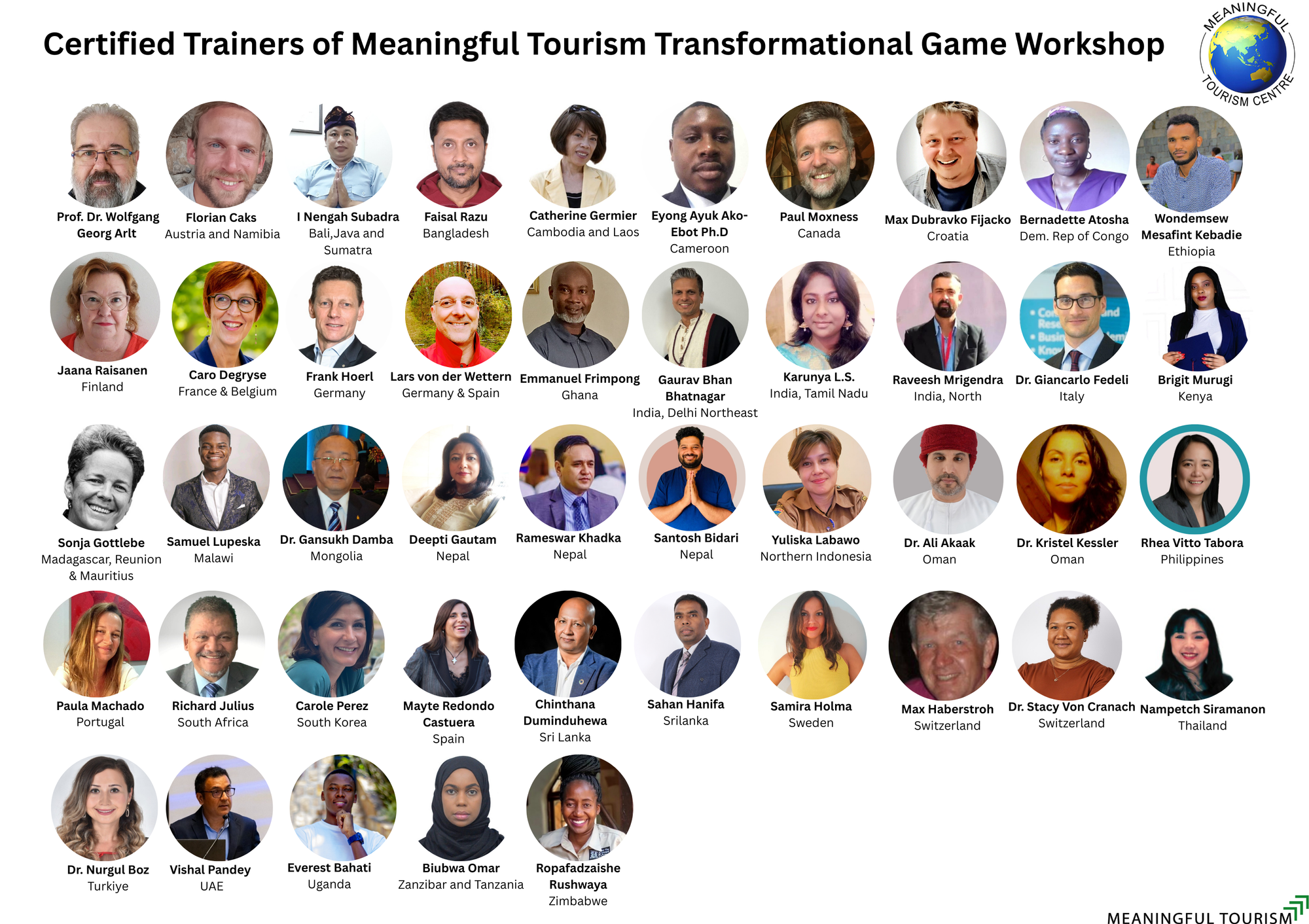
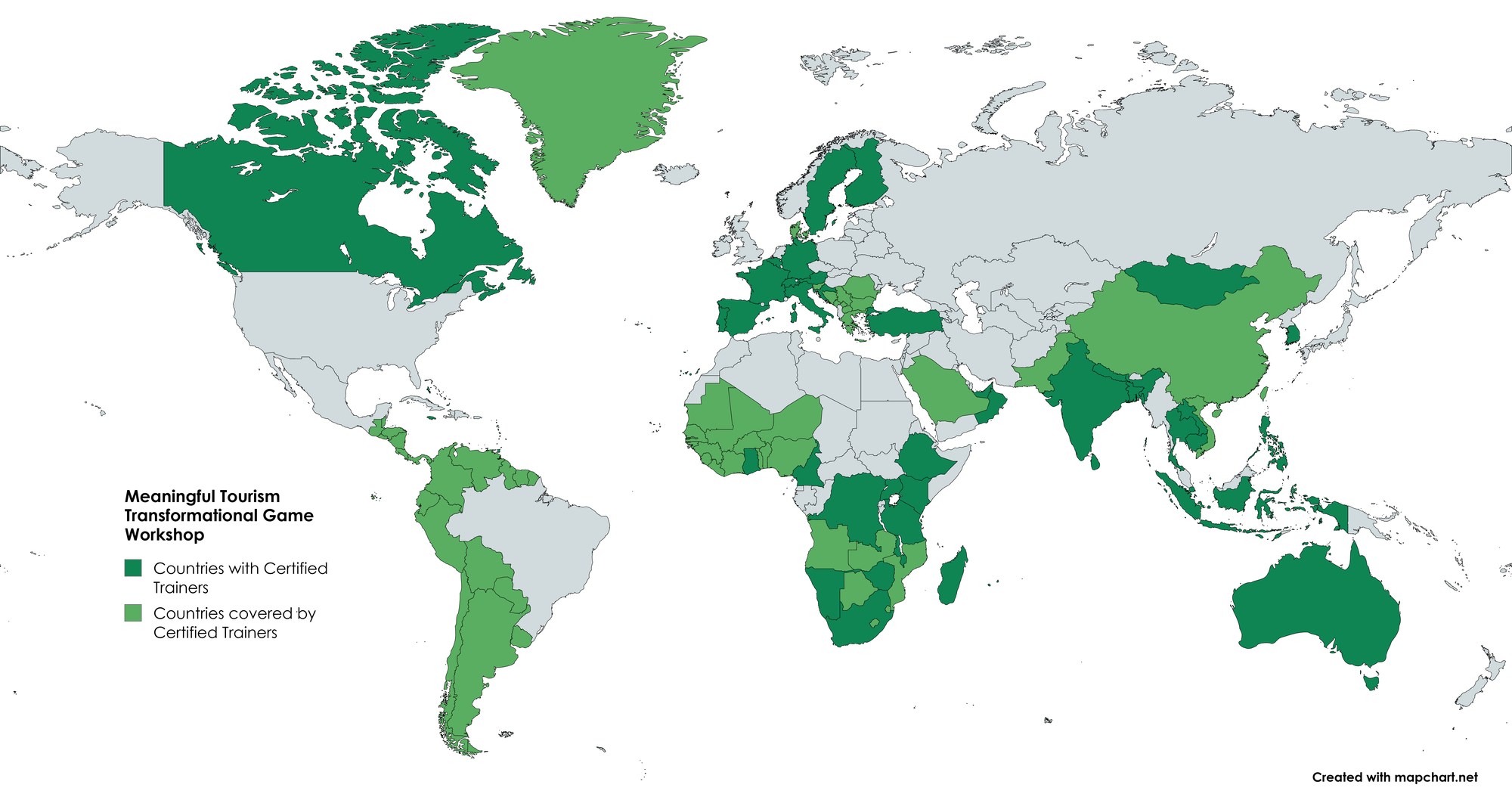
With almost 50 Certified Trainers, many countries and regions of the world are already covered. However, MTC continues to look for professionals with experience in training or lecturing and a passion for sustainable tourism.
If you are interested in becoming a Certified Trainer for the Meaningful Tourism Transformational Game Workshop for a country not marked in dark green on the map above, please contact us at office@meaningfultourismcentre.org.

MTC Podcast with the organisers of the Pakistan Travel Mart (PTM)

At the podcast, Prof. Dr. Wolfgang Georg Arlt will be discussing China’s outbound tourism and Meaningful Tourism.
The podcast will be available on the PMT YouTube channel starting October 5, 2025.
Sustainable Destinations Forum 2025 in Expo City Dubai

Prof. Dr. Arlt will speak at the Sustainable Destinations Forum (SDF) 2025 workshop on October 29 about Destination experiences.
Dr. Ali Akaak will speak earlier on the same day in another workshop about KPIs for destinations. Both will explain how Meaningful Tourism tools can be applied successfully for destination development.
The full program will be available in the coming days here.
The ticket is priced at 160 Euros and includes full access to the Forum Days:
October 28: Access to the forum, lunch, awards ceremony, and special heritage desert dinner
October 29: Workshop access and lunch
Green Destinations is offering all readers of Meaningful Tourism Weekly a special 25% discount on the participation fee.
For booking, please contact us at info@meaningfultourismcentre.org.
Meaningful Tourism Transformational Game Workshop at World Travel Market, London
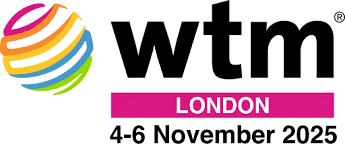
World Travel Market (WTM) in London is one of the must-attend annual events for key players in the tourism industry. The Meaningful Tourism Centre will offer a special Meaningful Tourism Transformational Game Workshop on the day before the start of WTM 2025, on November 3, 2025, from 9:00 to 16:00 hours. The workshop will be conducted by Prof. Dr. Wolfgang Georg Arlt FRGS FRAS, the founder of MTC.
There are only 30 seats available, so if you already know that you will attend WTM 2025, make sure you arrange your schedule to arrive on time for the training workshop on Monday, November 3, 2025.
Book your seat now and enjoy the Early Bird fee.
Venue: Central London, details to be advised. Transport from/to the hotel or Excel London can be arranged on request at a special rate.
Participation fee: 200 Euros per person
VAT included if applicable.
Two or more seats booked at the same time enjoy an additional 10% discount.
Please note that payments are non-refundable. However, a change of participant is possible without additional fee until one day before the training workshop.
The participation fee includes training workshop participation, a certificate of participation, one year of free access to all content, including the Meaningful Tourism Weekly Library reserved for paid subscription holders, coffee/tea, cookies, and a vegetarian and non-vegetarian lunch buffet.
On the evening of November 3, 2025, there will also be a (self-paid) dinner followed by drinks with an opportunity to network with participants and to meet several of the Meaningful Tourism trainers from different countries.
For bookings, please contact office@meaningfultourismcentre.org.
Bookings will be closed once 30 reservations have been reached.
About Meaningful Tourism Weekly
Meaningful Tourism Weekly is published every Thursday by Meaningful Tourism Centre (MTC) - London and Kathmandu in collaboration with Travel Asia Now, led by Rhea Vitto Tabora. This partnership enhances the newsletter’s professional production and distribution, bringing added value to our readers.
Each issue features Editorial, updates on MTC activities, a Best Practice Example, a profile of an MTC-certified trainer, news about upcoming events, and occasionally additional op-ed pieces from guest authors. Carefully selected news items, including videos and podcasts, are also included, with links to their original sources in the Meaningful Tourism News section.
Subscription to Meaningful Tourism Weekly is free, with the addition of a paid content section that includes a library of surveys, exclusive articles, conference presentations, and statistical data, offering subscribers invaluable resources.
Sponsorship opportunities are available for those interested in supporting this initiative.
For more information about MTC's training programs, market research, product adaptation, consulting services, conferences, strategy development, and marketing, visit our website or email us at info@meaningfultourismcentre.org.

